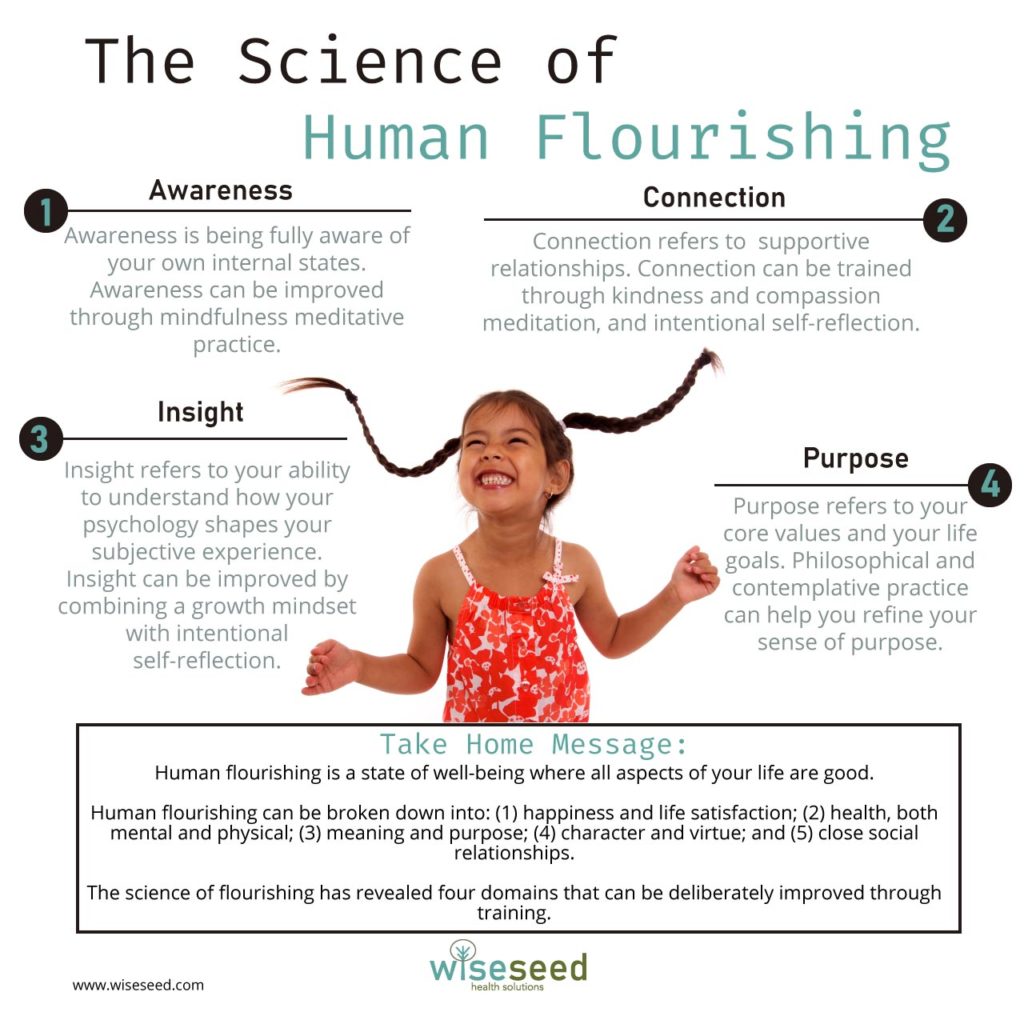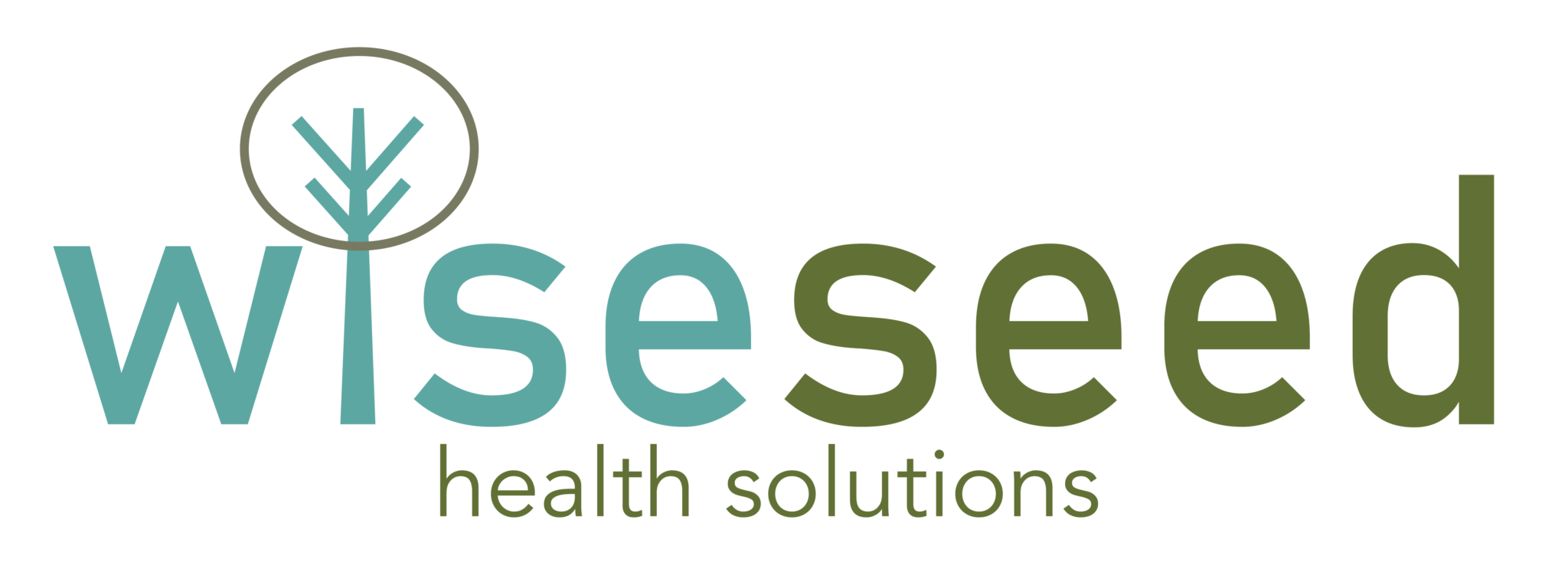The Science of Human Flourishing

What is human flourishing?
The ancients called human flourishing Eudaimonia 1. Since then, the greatest minds in human history have spent their lives trying to work out what human flourishing is, and how to best go about obtaining it. Fortunately, the fields of philosophy, human psychology, and neuroscience are now converging on a definitive answer 2-5.
The best definition of human flourishing that I’ve come across was recently proposed by Tyler VanderWeele in his beautiful manuscript ‘On the promotion of human flourishing’ 3. According to Dr. VanderWeele, human flourishing can be broken down into five domains. These are ‘(1) happiness and life satisfaction; (2) health, both mental and physical; (3) meaning and purpose; (4) character and virtue; and (5) close social relationships’ 3.
A rough-and-ready measure of human flourishing.
No doubt, most of you have an overall sense as to how well your life is going. However, as Peter Drucker famously stated, ‘only what gets measured gets managed’ 6.
Thus, a mere gut feeling is not going to cut it if you are serious about maximizing your flourishing.
Lucky for you, Dr. VanderWeele has created a simple questionnaire based on his five domains of human flourishing 3. Each question within the measure is scored on a scale of 1 – 10, with two questions for each domain of human flourishing. Your current ‘human flourishing’ score is obtained by summing the result of all twelve questions 3.
Here’s the survey.
Domain 1: Happiness and Life Satisfaction.
Q1: Overall, how satisfied are you with life as a whole these days?
0 = Not Satisfied at All, 10 = Completely Satisfied
Q2: In general, how happy or unhappy do you usually feel?
0 = Extremely Unhappy, 10 = Extremely Happy
Domain 2: Mental and Physical Health.
Q3: In general, how would you rate your physical health?
0 = Poor, 10 = Excellent
Q4: How would you rate your overall mental health?
0 = Poor, 10 = Excellent
Domain 3: Meaning and Purpose.
Q5: Overall, to what extent do you feel the things you do in your life are worthwhile?
0 = Not at All Worthwhile, 10 = Completely Worthwhile
Q6: I understand my purpose in life.
0 = Strongly Disagree, 10 = Strongly Agree
Domain 4: Character and Virtue.
Q7: I always act to promote good in all circumstances, even in difficult and challenging situations.
0 = Not True of Me, 10 = Completely True of Me
Q8: I am always able to give up some happiness now for greater happiness later.
0 = Not True of Me, 10 = Completely True of Me
Domain 5: Close Social Relationships.
Q9: I am content with my friendships and relationships.
0 = Strongly Disagree, 10 = Strongly Agree
Q10: My relationships are as satisfying as I would want them to be.
0 = Strongly Disagree, 10 = Strongly Agree
Domain 6: Financial and Material Stability.
Q11: How often do you worry about being able to meet normal monthly living expenses?
0 = Worry All of the Time, 10 = Do Not Ever Worry
Q12: How often do you worry about safety, food, or housing?
0 = Worry All of the Time, 10 = Do Not Ever Worry
Full disclosure: I scored 71 out of 120 possible flourishing points. This means that I am currently languishing at a mere 59% of my maximal flourishing potential (sad face).
While this is not a disaster, I’m certainly not going to get high-fives from the ancients based on my current level of Eudaimonia. In fact, I have plenty of room to grow on the flourishing front.
The point, however, is not to use your flourishing score as another opportunity to self-flagellate and feel guilty. That’s what in-laws are for.
Instead, your score is a simple and effective tool to help you identify and then focus on those aspects of your life that need more work.
How do you flourish?
This is the trillion-dollar question that kept Socrates, Plato, and Aristotle awake at night.
Alas, despite thousands of years of inquiry, debate, and contemplation, no definitive answer to this question has been forthcoming. Until now.
The breaking news is that the integration of philosophy, positive psychology and neuroscience is starting to provide some clues about how to live a good life 2-5.
Recently, Dr. Dahl, Dr. Wilson-Mendenhall, and Dr. Davidson published a wonderful summary of the latest methods that you can use to increase your everyday flourishing 5.
They argue (convincingly) that there is strong evidence that human flourishing can be improved through intentional mental training 5. Better yet, they have conveniently identified four core dimensions of human flourishing that can be improved with training—awareness, connection, insight, and purpose.
Awareness
Awareness is ‘being fully aware of what one is doing, whom one is with, and of one’s own internal states’ 5. You can train yourself to be aware of your conscious experience and you can intentionally self-regulate your attention 5.
Your ability to notice distractions and redirect your attention improves your performance in a variety of settings. For example, being able to refocus attention improves your academic performance 5.
In addition, enhanced awareness also increases your ability to regulate your emotions, which has strong positive benefits for your long-term physical and mental health 5.
Awareness can be trained through mindfulness meditative practice, as well as by using cognitive interventions that improve executive function 5.
Connection

Connection refers to a ‘subjective sense of care and kinship toward other people that promotes supportive relationships and caring interactions’ 5.
Connection consists of high levels of empathy and compassion that improve your overall well-being, increases your self-esteem, and empowers you with more constructive approaches to solving interpersonal problems 5. This in turn helps you build and maintain the social networks that protect you against depression and anxiety 5. In fact, having a strong social network is the best predictor of your overall long-term health.
Your ability to make meaningful and productive human connections can be improved through kindness and compassion meditation, as well as intentional self-reflection 5.
Insight
Insight refers to your ability to understand how your emotions, thoughts, beliefs, and psychological processes shape your subjective experience and sense of self 5.
An important benefit of improving your insight is that it helps you identify your beliefs that drive maladaptive behaviors, enabling you to quickly course-correct when you start heading down a bad path 5. Insight combined with a compassionate growth mindset is a predictor of overall well-being and life satisfaction and helps you fight off depression and anxiety 5.
One way to increase your insight is to combine a growth mindset with intentional self-reflection that is motivated by openness, curiosity, and self-compassion 5.
Purpose
Purpose refers to your core values and your life goals. Your core values are those underlying principles that you hold most dear. Core values can include honesty, integrity, work ethic, and compassion.
Your life goals are important because they provide a powerful tool that helps focus your life on your core values. As we’ve discussed, having a strong sense of purpose increases your everyday resilience, because a strong sense of purpose provides a meaningful focus that keeps you moving forward in the face of adversity 5.
Purpose is a pillar of human flourishing in the contemplative and philosophical traditions. And for good reason. Having a strong sense of purpose is associated with a raft of positive health outcomes including increased physical activity, reduced cardiovascular disease, and a lower risk of death 5. Having a sense of purpose can also improve your memory, increase your cognitive function, and improve your overall resilience 5.
Although your sense of purpose can be trained using a variety of modern interventions 5, consider including the traditional schools of philosophy and contemplative practice in your training. After all, they’ve lasted this long for good reason.
Take Home Message
We are experiencing a revolution in the science of human flourishing. As a result, a higher level of human flourishing is now a realistic goal for anyone who is willing to put in the work.
I for one am very happy about that!
Please click on the link below to download your free PDF!

References and Further Reading
1. R. Sharples, Daniel N. Robinson, Aristotle’s psychology, New York, Columbia University Press, 1989, 8vo, pp. xi, 144, $28.00. Medical History 35, 259-259 (1991).
2. C. D. Ryff, Psychological well-being revisited: Advances in the science and practice of eudaimonia. Psychotherapy and psychosomatics 83, 10-28 (2014).
3. T. J. VanderWeele, On the promotion of human flourishing. Proceedings of the National Academy of Sciences 114, 8148-8156 (2017).
4. E. Diener, S. Oishi, L. Tay, Advances in subjective well-being research. Nature Human Behaviour 2, 253-260 (2018).
5. C. J. Dahl, C. D. Wilson-Mendenhall, R. J. Davidson, The plasticity of well-being: A training-based framework for the cultivation of human flourishing. Proceedings of the National Academy of Sciences 117, 32197-32206 (2020).
6. P. Klaus, in Measuring Customer Experience. (Springer, 2015), pp. 81-101.
Disclaimer
The material displayed on this website is provided without any guarantees, conditions or warranties as to its accuracy.
Information written and expressed on this website is for education purposes and interest only. It is not intended to replace advice from your medical or healthcare professional.
You are encouraged to make your own health care choices based on your own research and in conjunction with your qualified practitioner.
The information provided on this website is not intended to provide a diagnosis, treatment or cure for any diseases. You should seek medical attention before undertaking any diet, exercise, other health program or other procedure described on this website.
To the fullest extent permitted by law we hereby expressly exclude all warranties and other terms which might otherwise be implied by statute, common law or the law of equity and must not be liable for any damages whatsoever, including but without limitation to any direct, indirect, special, consequential, punitive or incidental damages, or damages for loss of use, profits, data or other intangibles, damage to goodwill or reputation, injury or death, or the cost of procurement of substitute goods and services, arising out of or related to the use, inability to use, performance or failures of this website or any linked sites and any materials or information posted on those sites, irrespective of whether such damages were foreseeable or arise in contract, tort, equity, restitution, by statute, at common law or otherwise.

Ten Minutes is All You Need
Research has shown that ten minutes of moderate-to-vigorous exercise performed each day is enough to significantly reduce your risk of early death.
1 Comment
Leave a Comment
- « Previous
- 1
- …
- 31
- 32
- 33




You know this article reminds me of my yoga teacher at UQ, who used to say “when you are in pain, you cannot be happy”.
Carving some time in ones schedule for exercising is totally worth it. After reading your article, I think if you get an exercise buddy or if you befriend your exercise pals, you get some points in other categories too! Alright, off to my pilates class, let’s try and flourish a little today 😀